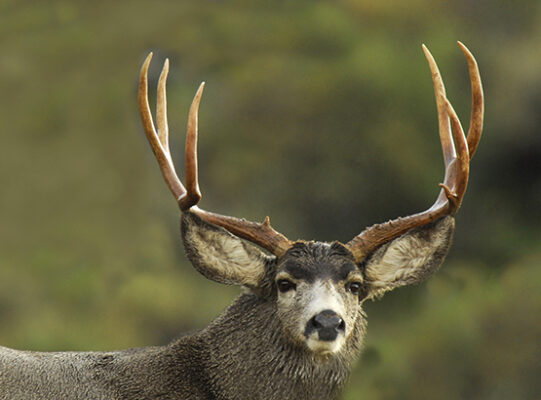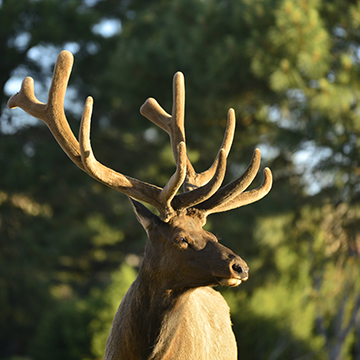Wildlife Associated Diseases and Health Monitoring
Wildlife resources are under constant change due to human population growth, introduction of invasive species, and habitat loss and degradation. These factors can contribute to the emergence of infectious diseases. Wildlife species are subject to diseases resulting from exposure to bacteria, viruses, parasites, toxins, and other biological and physical agents. Wildlife species can be natural hosts for diseases that affect humans. The diseases which are directly transmitted from animals to humans are referred to as zoonotic diseases. Diseases transmitted from animals to human via vectors (usually through insect bites) are referred to as vector-borne diseases. The Department investigates significant wildlife disease and mortality events.

chronic wasting disease
To report dead wildlife
If you have a wildlife related emergency, call our 24 hour dispatch center at 623-236-7201. Wildlife health personnel will respond Monday through Friday during normal business hours. You can leave a message if it is before or after business hours. Fresh samples are required for testing. A recently dead small animal or bird may be collected by wearing gloves, double bagged, and frozen. If the animal you are calling about has been shot and you are reporting possible illegal activity, call Operation Game Thief 800-352-0700.
For sick or injured wildlife contact a wildlife rehabilitator.
Common Diseases of Wildlife in Arizona

Pneumonia in bighorn sheep
A bacterial respiratory infection transmitted to wild bighorn sheep from contact with livestock, primarily domestic sheep. It is often fatal, and is a major threat to wild populations.

Rabies
Rabies is a viral infection of the nervous system. Exposure occurs with a bite from a carrier such as a bat, fox, and skunk. Signs include activity during abnormal hours and extremely aggressive or allowing humans to approach. It is almost always fatal if post-exposure treatment is not sought immediately.

Pigeon paramyxovirus in Eurasian Collared Dove
A contagious viral disease that mainly affects the Eurasian collared dove. The virus can cause abnormal behavior and twisting of their necks. Birds become infected through bodily fluids and droppings of other birds, and contaminated feeders or waters.

Trichomoniasis (Mourning Dove)
A parasitic disease mainly in pigeons and doves that causes difficulty eating or drinking, weakness, and death. It is transmitted through feed and water contaminated by saliva from infected birds. Cleanliness and fewer birds at feeders can help decrease this disease.

Rabbit Hemorrhagic Disease Virus
RHDV2 is a highly contagious and deadly virus in wild and domestic rabbits. Wild rabbits are often found dead with blood around the nose.

Avian Botulism
Avian botulism is caused by a naturally-occurring toxin found in aquatic environments that causes weakness, paralysis and death, primarily in waterfowl. It is more common in hot summer months. Water management and carcass removal are helpful to decrease intoxications.

Tularemia
A bacterial disease often seen in rodents and rabbits, but can also affect people and domestic animals. It can be transmitted through contact with infected animals or carcasses, ticks, and biting insects.

Avian Influenza
Avian influenza is a virus that naturally occurs in wild birds, especially waterfowl, and usually doesn’t cause disease. The highly pathogenic strains (HPAI) can cause severe disease and death in domestic poultry, wild birds, and occasionally in mammals.

Elaeophorosis
Elaeophorosis is caused by a parasite in white-tailed deer and elk. It obstructs blood flow to the head which can result in facial and jaw swelling, decreased ability to chew, and blindness. Mule deer are typically resistant to infection.

Hemorrhagic Disease (EHD and Bluetongue)
Hemorrhagic disease is transmitted by tiny midges, caused by two closely related viruses. It can affect deer, elk, bighorn sheep, and pronghorn, and is usually seen from August through October.

Plague
Plague is a deadly bacterial infection transmitted by fleas, contaminated soil, or by interacting with infected animals. Rodents and rabbits are the most common hosts, and prairie dogs are strongly affected. Plague can cause severe disease in humans and pets.
Health and Disease Programs at AZGFD
contacts
Anne Justice-Allen, DVM, Department Veterinarian
623 236-7351 ajusticeallen@azgfd.gov
Ann Fan, DVM, Assistant Veterinarian
623 236-7227 afan@azgfd.gov
Precautions to Reduce Disease Exposure
precautions to reduce disease exposure
Some general precautions should be taken to reduce risks of exposure to diseases carried by wildlife. Approaching or handling wild animals, especially those that look sick or behave abnormally is not recommended. Procedures for basic personal hygiene should be practiced and processing equipment should be kept clean. Some important precautions to remember are as follows:
- Wear protective clothing, particularly reusable rubber or disposable latex gloves, when dissecting or skinning wild animals.
- Work area, knives, other tools, and reusable gloves should be cleaned with a disinfectant soap, or a detergent followed by diluted household bleach.
- Touching your face, eating, drinking, or smoking while handling animals should be avoided.
- Hands should be thoroughly washed after any handling any wildlife. Alcohol sanitizer is only effective if hands are not soiled. While in the field, use of moist towelettes, followed by hand sanitizer can be used to simulate hand washing.
- Carcasses and tissues as well as any contaminated disposable items such as latex gloves should be disposed of by sealing in a durable plastic bag and taken to a landfill in the animal carcass designated area. If the animal is found in a wild area (such as BLM, National Forest Service), then burying deeply, to prevent scavenging by animals is another viable option.
- Animals that appeared ill, found dead with unknown cause of death, or with abnormalities in the flesh should not be consumed.
- Game meat should be cooked thoroughly.
- A mosquito or tick repellent (i.e. DEET or picardin), wearing long-sleeved shirts and pants with the cuffs into socks should be used in areas where ticks and mosquitos occur.
- Ticks should be removed immediately with tweezers. Grasp ticks as close to the skin as possible and pull the head of the tick loose with a slow, steady motion.
- Sleeping directly on the ground is not recommended.
- All pets should be kept under close supervision, and preferably on a leash.
- All pets should be vaccinated for rabies by a licensed veterinarian.
- A physician should be contacted if you become sick, especially with flu-like symptoms, following exposure to a wild animal or ectoparasite (i.e. tick, flea, or mosquito). The physician should be informed of any risk of exposure to zoonotic or vector-borne diseases.
Want to Get Involved with Wildlife Conservation?
Volunteer your time, or donate to help us with conserving and protecting our wildlife. When you purchase a hunting or fishing license online, resources go back into wildlife conservation.
donate to wildlife conservation
With your help, we can continue to conserve & protect Arizona’s wildlife.
volunteer for projects
If you have a passion for wildlife and want to help us conserve and protect it, we’d love to have you on our team!
